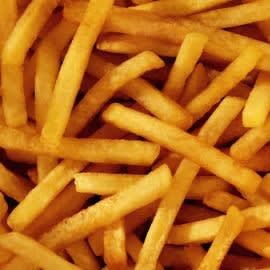
July 2011
By Rabbi Chaim Goldberg
OU Rabbinic Coordinator
To submit questions for future columns, please send them to {encode=”KosherQ@ou.org” title=”KosherQ@ou.org”}, or call the Kosher Consumer Hotline, at 212-613-8241.
“Holy Fries”
Q: How are industrial French fries made?
A: Exactly who came up with the idea of French fries is a matter of serious debate (as serious as debate can be about such topics!), but there is no debate on the fact that industrial French fries were commercialized by J.R. Simplot in the 1940s. The first major French fries customer (and the largest single source of industrial demand for the item until this day!) is McDonalds, whose famous golden shoe string French fry is world renowned (though not kosher).
French fries are made primarily from Russet-Burbank potatoes, and a third of all Russet potatoes grown in the United States come from Idaho. Potatoes are harvested in August, and stored a whole year long for fresh potato consumption and industrial processing alike. The potatoes are brought to frying facilities, where they are sorted, de-stoned (there are lots of rocks that get mixed with the potato harvest!), washed, scrubbed (with brushes to remove the peel on those products that do not have the skin on), slightly pre-cooked (to keep the potatoes from shattering when they are cut), cut with a water knife into various cut shapes (the potatoes are carried via a water flume – something like what you might ride in an inner-tube! – into a set of sized blades, which cuts each potato into its various shapes), pre-cooked again (to soften up the potatoes a bit before frying), battered (for those products that are extra crispy, or spicy) and fried in boiling oil. The finished product is frozen, bagged, placed into cases, and shipped to warehouses for distribution.
Q: What kashut issues are there with French fries?
A: The number one issue we are concerned with when it comes to French fries are those factories which produce for (or at one time produced for) McDonalds, as their French fries are made with a special flavored oil which contains a beef tallow flavor (that is not kosher). Since the beef tallow is present in the oil in enough concentration for it to give non-kosher taste into the equipment, any piece of equipment which handles (or handled) McDonald’s (or any other beef tallow, or beef tallow flavored) French fry with heat needs to be kashered before it can be used to make OU certified French fries. This is an involved process, where the equipment must be cleaned to bare metal (including fryers which often have burnt oil stuck onto processing equipment) and left cold for 24 hours, prior to being filled with boiling water under the on-site supervision of a mashgiach.
We also need to confirm the kosher status of the oil used in the facilities, and that the transportation equipment (usually railcars, sometimes trucks) has been kosher certified to carry kosher oil. There are anti-foams used in the plants as well which are potentially kosher sensitive, as well as seasonings and batters to check for proper kosher certification.
Q: A certain company sells many OU certified French fries, but some cuts of French fries do not carry the OU symbol. Was that a mistake? If not, how non-kosher could these French fries be?
A: Excellent question, if I do say so myself! French fries which do not bear the OU symbol should not be assumed to be kosher, despite the ingredient statement not containing any obvious non-kosher ingredients. The reason is that there are non-OU factories which make French fries on the same equipment that they use to make beef tallow and beef tallow flavored French fries. The equipment in these factories is 100 percent non-kosher, as is the oil which is used on this equipment. It is sometimes necessary for someone who used non-OU French fries to kasher the pan on which the French fries were cooked, so it is critical to check the label every time. Some OU companies maintain non-kosher facilities where SIMILAR (but never the exact same) product is made without kosher supervision. These companies may distribute and sell non-kosher French fries right next to the kosher ones in the same refrigerator case at the supermarket, so extra diligence is critical when buying French fries!
Q: How does OU make sure the non-kosher French fries never have the OU on them?
A: We have a several-pronged approach to ‘this issue. Firstly, we make sure the factories understand how critical it is that OU products are never made in a non-OU plant, and that non-kosher items can never be made in the OU plant. Secondly, we have mashgichim visit the non-OU plants, to make sure no kosher items are found there. Thirdly, we regularly check UPC codes to make sure items authorized to be OU certified are only made in OU plants. In addition, customers who wish to “double check” that their French fries are kosher can visit www.oukosher.org and check our database to make sure the UPC code matches the one on our database. Grab your ketchup and enjoy!
The words of this author reflect his/her own opinions and do not necessarily represent the official position of the Orthodox Union.
